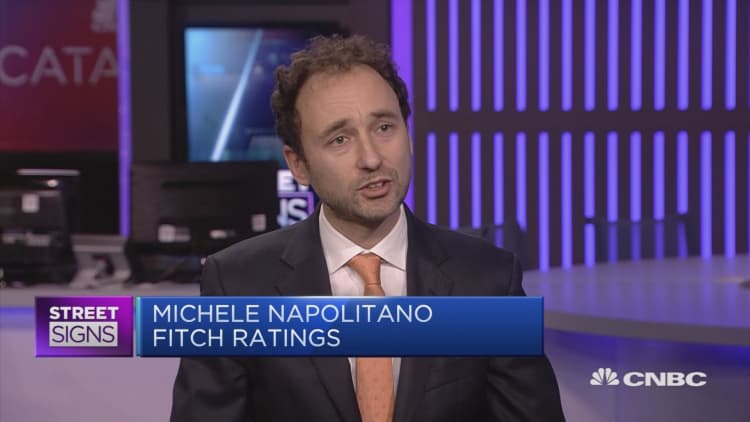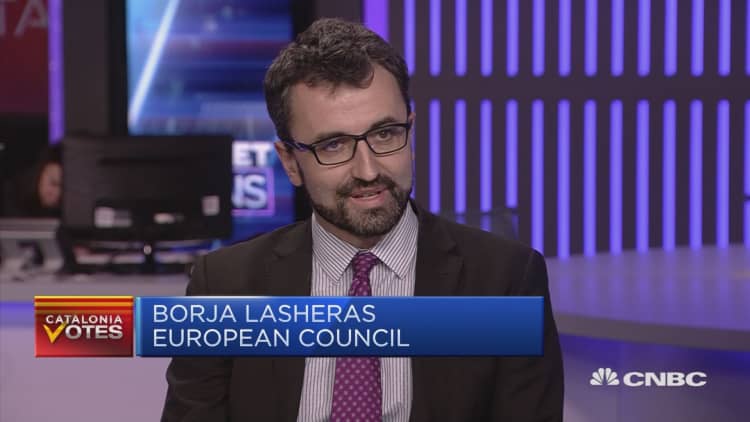
Catalonia, the rebel region of Spain that declared itself independent, is holding parliamentary elections on Thursday which are seen as a major test for pro-independence politicians and parties.
Polls show the contest between pro-secessionist and unionist (also known as constitutionalist, pro-Spain) parties is too close to call, leading to a possible hung parliament where no one party has a majority.
"It's crucial to look at who will have a majority and it looks like no one will have a proper majority," Borja Lasheras, policy fellow at the European Council on Foreign Relations and the director of the Madrid Office, told CNBC Tuesday.
"You see a very divided society in Catalonia with extremely competing narratives and Catalonia will remain deeply fractured (whatever the result)."
The election comes after a period of quiet following the chaotic and fast-moving scenes in October when the regional government declared independence following a referendum, held in defiance of Spain's attempts to ban the vote, at the start of October.
Political crisis ensued with the Spanish government imposing direct rule on Catalonia, ousting the Catalan president and government and calling fresh elections. What's more, several pro-independence politicians including Catalan President Carles Puigdemont, fled to Belgium when Spain issued a warrant for their arrest on serious sedition charges.
Puigdemont remains in self-imposed exile in Belgium where he has campaigned ahead of the vote. His former deputy, Oriol Junqueras, is contesting the election (as leader of the alliance between the Catalan Republican Left party - the ERC) from prison as he too faces sedition charges and has been refused bail by a judge who feared he would repeat his secessionist activities.
What could happen either way?
Polls currently suggest that the three pro-independence parties will attain around 67 or 68 seats (the number needed for a majority) in the 135 seat parliament, meaning that they are at the point where a majority hangs in the balance.
This pro-independence coalition, Junts pel Catalonia, led by Puigdemont is a pro-secession force in the election race but there has been considerable fragmentation within the movement with several pro-independence parties and politicians running against Puigdemont, including his former deputy Junqueras.
Meantime, the secessionist movement is facing stiff competition from Ciudadanos, a key ally of Spain's ruling Popular Party led by Prime Minister Mariano Rajoy, and a party that is strongly opposed to independence.

Polls suggest that voters will be broadly split between the pro-unity and pro-independence camp, however. The two parties expected to gain the most seats individually are the pro-unity Ciudadanos and Junqueras' pro-independence ERC, seen level-pegging in polls with each potentially gaining 32 or 33 seats.
Lasheras at the European Council on Foreign Relations said that the last election in 2015 was a lot clearer in terms of political narrative and policies but that fragmentation had now made things unclear.
"In the last 2015 elections, the secessionists had a parliamentary majority but not a popular vote majority," Lasheras said. "(Now) you have Puigdemont in Belgium, you've got Junqueras (Catalonia's deposed vice-president) in prison so it's unclear as they've lost the narrative in a way" he said.

Wolfango Piccoli, vice president at risk consultancy Teneo Intelligence, agreed that the regional election is likely to lead to a hung parliament with no one party gaining a majority.
"Even if pro-independence parties obtain a majority of seats, it is not a foregone conclusion that they will be able to quickly form a government," he noted.
"The separatist movement remains divided on who should be the next first minister and whether the next government should continue to push for independence unilaterally. Government-formation negotiations will likely be protracted," he added.
Piccoli said that, all being well, an investiture vote would take place early next year, triggering the two-month deadline for parliament to elect a first minister. "If parties fail to do so, parliament would be automatically dissolved and new elections would be held within 40-60 days following the date of the dissolution," he said.

Economic impact?
Catalonia's elections are important because more political uncertainty could weigh on Spain's recently bright economic outlook. The Bank of Spain said last week that it saw gross domestic product growing 3.1 percent in 2017 but forecast a rise of 2.4 percent in 2018.
The central bank acknowledged that Catalonia was a risk surrounding its projections, noting that "the political tension in Catalonia could potentially affect agents' confidence and their spending decisions and financing conditions."
In a note looking at the economic impact of the Catalan election, Rabobank's rates strategists Richard McGuire, Lyn Graham-Taylor and Matt Cairns, explained what could happen if pro-independence parties achieved a majority.
"(In the) short-term, this (result) would be unlikely to herald any really significant spread widening (in terms of borrowing costs) for Spain, with the reasoning behind this being that the national government has already demonstrated that it will not allow Catalonia to make a unilateral decision to separate from the country," they said in a note on Tuesday.
However, the strategists said that a pro-independence majority, in the long term, meant "heightened uncertainty will remain about what the future holds for the structure of Spain — with this likely (to) have a dampening impact on growth. This is key because it is the growth rate that is the real standout bright spot for Spanish debt metrics," the strategists said.
They added that even if pro-independence parties were a minority in the parliament, "it still seems reasonably likely that 2018 will see some move by the Spanish government to try and deal with some of the grievances raised by Catalonia."
Lasheras told CNBC that it was likely that the Spanish government would implement some kind of constitutional reform to appease secessionists in Catalonia, but this would happen over the medium term and it would not be a "panacea" for the region where there is both strong pro-independence and pro-unity feeling.
"The government of Mariano Rajoy is very keen on making some concessions on financial transfers (in terms of Catalan taxes that go to Madrid) but they're putting the brakes on constitutional reform," he said. "I see it happening in the mid-term, not short-term, there will be signs along that way. Catalonia will remain deeply fractured I'm afraid," he added.


